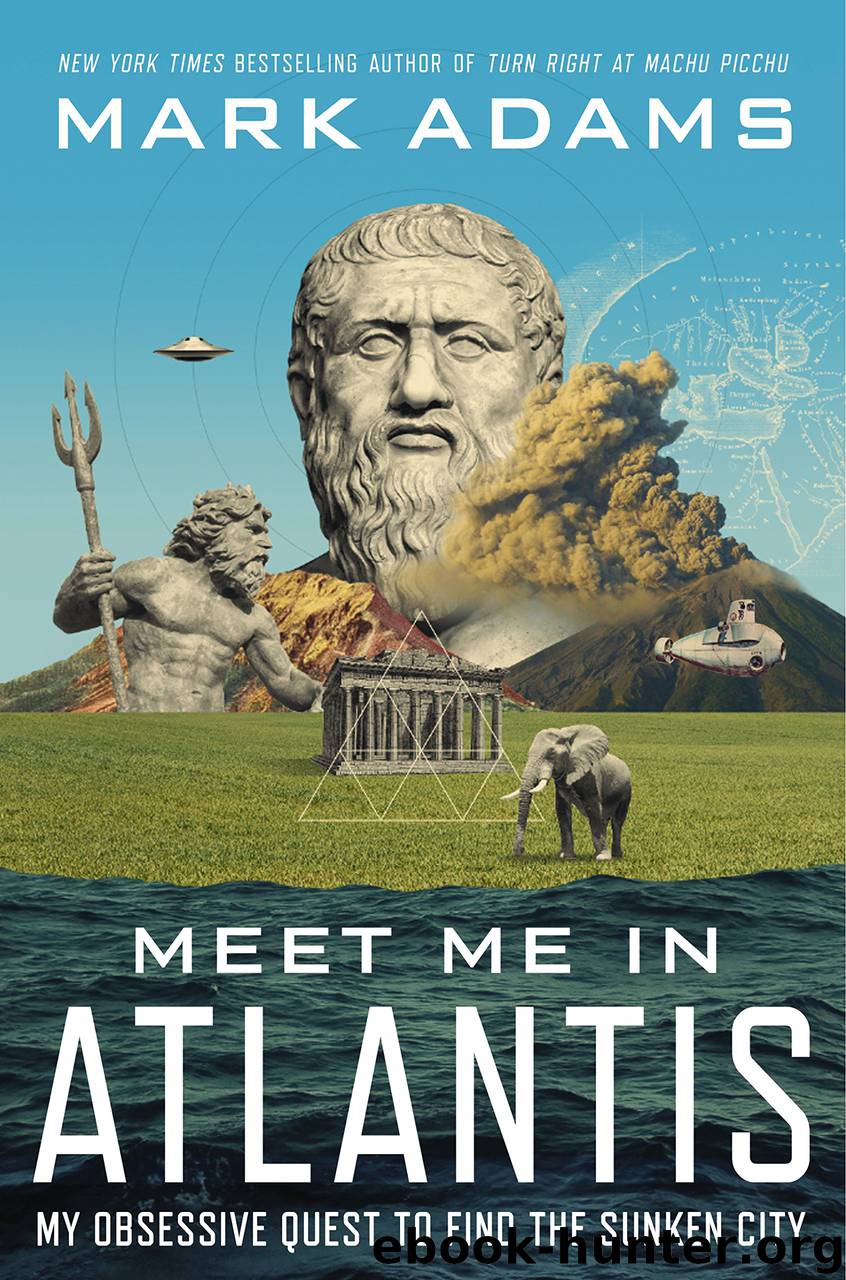Meet Me in Atlantis: My Obsessive Quest to Find the Sunken City by Mark Adams

Author:Mark Adams [Adams, Mark]
Language: eng
Format: epub
Publisher: Penguin Publishing Group
Published: 2015-07-16T16:00:00+00:00
CHAPTER TWENTY
Triangulating Pythagoras
Plato’s Academy, Athens (ca. 360 BC)
If Christos Doumas was correct, the Atlantis tale was solely a literary invention, like the Cave of the Ideas, created to illustrate the political model Plato placed at the center of what is probably the most influential work in the history of philosophy, the Republic. Near the start of the Timaeus, Socrates reminds his friends that “the chief theme of my yesterday’s discourse was the state—how constituted and of what citizens composed it would seem likely to be most perfect.” He then expresses a desire to see his ideas brought to life, in a story about how Athens “when at war showed by the greatness of her actions and the magnanimity of her words in dealing with other cities a result worthy of her training and education.” This is Critias’s cue to start telling the story he heard of the war between Athens and Atlantis.
But what was Plato’s ideal state? Strange though it may seem today, one of the Cradle of Democracy’s greatest citizens was no populist. His noble lineage predisposed him to negative feelings toward democracy, which he wrote “distributes a sort of equality to both equals and unequals alike.” Average citizens were easily swayed by rhetoric; a majority had repeatedly voted in support of the disastrous military campaigns of the Peloponnesian War against Sparta, which ended with the defeat of Athens in 404 BC, including a reckless invasion of Syracuse that ended with the loss of thousands of Athenian soldiers and two fleets of warships. Following the war Athens was briefly ruled by a brutal oligarchy installed by the Spartans. When democracy was restored, Socrates, who was himself no populist, was prosecuted for the crimes of “refusing to recognize the gods of the state” and “corrupting the youth of Athens.” Socrates was found guilty by a majority vote and sentenced to death. He chose to die by drinking hemlock rather than escape into exile. In Plato’s beautiful dialogue the Phaedo, one of the witnesses to Socrates’s death presumably speaks for the author when he says, “My own tears came in floods against my will.”
Following the death of Socrates in 399 BC, Plato escaped Athens to travel widely for a decade, stopping in Libya, Italy, and Egypt, all three of which, of course, later appeared in his Atlantis tale. In 390 BC, he began a long stay in southern Italy and Sicily, a period during which he encountered two men who would greatly influence the path of his life and thinking. In the city of Taras (now Taranto), he met Archytas, a statesman who led his city according to the principles of Pythagoreanism. This school of philosophy, founded by the Greek expatriate Pythagoras around 530 BC, held that mathematics provided a key to unlocking the mysteries of the universe. Plato’s conversations with Archytas seem to have left him a convert to the Pythagorean veneration of numbers.
In Sicily, Plato met the dictator Dionysius I, a very different type of ruler. Dionysius controlled the powerful city of Syracuse absolutely.
Download
This site does not store any files on its server. We only index and link to content provided by other sites. Please contact the content providers to delete copyright contents if any and email us, we'll remove relevant links or contents immediately.
| Civilization & Culture | Expeditions & Discoveries |
| Jewish | Maritime History & Piracy |
| Religious | Slavery & Emancipation |
| Women in History |
Cecilia; Or, Memoirs of an Heiress — Volume 1 by Fanny Burney(32548)
Cecilia; Or, Memoirs of an Heiress — Volume 2 by Fanny Burney(31947)
Cecilia; Or, Memoirs of an Heiress — Volume 3 by Fanny Burney(31932)
The Secret History by Donna Tartt(19058)
Sapiens: A Brief History of Humankind by Yuval Noah Harari(14370)
Leonardo da Vinci by Walter Isaacson(13318)
The Radium Girls by Kate Moore(12018)
Sapiens by Yuval Noah Harari(5366)
How Democracies Die by Steven Levitsky & Daniel Ziblatt(5216)
The Wind in My Hair by Masih Alinejad(5092)
Homo Deus: A Brief History of Tomorrow by Yuval Noah Harari(4909)
Endurance: Shackleton's Incredible Voyage by Alfred Lansing(4769)
Man's Search for Meaning by Viktor Frankl(4585)
The Silk Roads by Peter Frankopan(4526)
Millionaire: The Philanderer, Gambler, and Duelist Who Invented Modern Finance by Janet Gleeson(4469)
The Rape of Nanking by Iris Chang(4203)
Joan of Arc by Mary Gordon(4101)
The Motorcycle Diaries by Ernesto Che Guevara(4089)
Stalin by Stephen Kotkin(3957)
